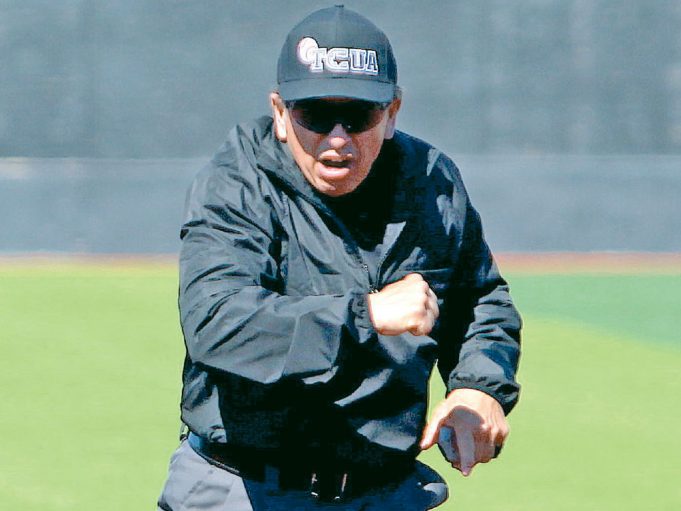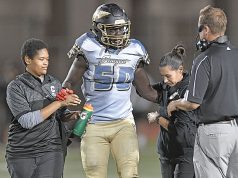M
nemonics are devices intended to assist the memory, as a verse or formula. A popular example, HOMES, is an acronym to help recall the names of the Great Lakes (Huron, Ontario, Michigan Erie, Superior).
There are six qualities that raise your officiating level. If you’re a mnemonics fan, sorry, there isn’t one to help you. But if you’re into alliteration, you’re in luck. They all start with the letter C. Away we go.
Confidence
To have any chance to be good at most anything, you need to have self-assurance, and officiating is no different. A lot of officials come from the ranks of former players so they understand their game and they’re used to being out on the court or field. But participating as an official is a whole different ballgame.
Confidence isn’t the same as arrogance. An arrogant official will rub everyone — coaches, players, assigners and fellow officials — the wrong way in a hurry. The right kind of confidence comes with several seasons worth of game experience utilizing knowledge gleaned from hours of studying rules and mechanics.
Rookie officials won’t necessarily have confidence, and if they do have some, it’s likely to be ripped out of them after their first few mistake-riddled games. A mentoring program can help instill confidence in newer officials. An association can assign one new official per crew to ride along and explore what a typical Friday night is like. Then, when that official works JV or freshmen games during the week, he or she can call a veteran official to discuss certain situations that arise.
Composure
Mastering self-control is right up there with gaining confidence, for new officials in particular. Not everyone is prepared for the disparagement, condemnation and indignity that officials must face and absorb with aplomb.
It’s a natural reaction to “hit back” when you’re being attacked. Veteran officials know about the need for composure. That means no shouting down with coaches, players and fans and keeping your wits about you when everyone else is up in arms.
Learning how to deal with different personalities is important. How do you deal with Coach A, who has an explosive personality, versus Coach B, who has a “buddy-buddy” personality? How do you deal with the fans? And one of the biggest ones is how do you adjust to different partners or crewmates?
Going into games with an “all for one” attitude and supporting each other can get you over some speed bumps. Experience is a great teacher. And sharing information with other officials can help.
Concentration
The ability to block out outside influences comes with time. Goodness knows there are plenty of things at a sporting event that can divert your attention. Everything from wild fans to smells from the concession stand to the band playing your favorite song can serve as a distraction if you let it.
If you can stay focused on your coverage area while blocking out the noises and sights that used to turn your head as a player or spectator, you’ve got half the battle won. At least you’re looking in the right area. Whether you can make correct judgments based on what you see might be another story.
Communication
Hand in hand with learning to concentrate is learning to communicate effectively with your partner or partners. Maintaining eye contact with a crewmate or having a quick conference with a partner are keys in game control and field or court coverage.
Communication between officials is vital. Let your partner know when you need help. Have a strong pregame and talk about who makes what call, who covers what base, who has the clock, confirming the downs, etc.
Official-to-official communication devices are becoming more common in sports such as football and soccer. But their value diminishes if the conversation goes beyond officiating the game. Used correctly, the headsets can be used to share vital information with crewmates and coaches. Discuss in pregame meetings when and how they will be used.
Cohesion
Give-and-take communication, whether it’s on the field or court, during association meetings or just anytime, anywhere, leads to a sense of fellowship. It’s esprit de corps among officials.
Joining an association has multiple benefits. One of them is letting others in the officiating community get to know you so they can help promote you. That’s especially important if you’re a newer official or new to the area. Athletic directors and assigners are often reluctant to take a chance on new people because they haven’t seen them work. Once you break through that ceiling, people tend to accept you as an official, your credit improves and people start to seek you.
Joining an association also helps officials get a regular work schedule and sometimes find a regular partner or crew. It also gives you a group of peers to bounce questions off of and trade games with should an emergency situation arise that prevents you from working a contracted game.
Commitment
The last and most important part of being a successful official is having a commitment to officiating — a commitment to getting better and a commitment to excellence. Officials committed to the avocation never stop trying to learn.
Being proficient with rules and mechanics can prevent a lot of problems before they happen. But there’s more to commitment than that.
There’s another side of commitment newer officials, or those looking to move up the ladder, tend to overlook — time and financial demands.
You need the proper uniform, including whistles, hats, beanbags, ball-strike indicators and whatever else your sport requires. There are fees that must be paid to local, state and national associations. Educational materials such as rulebooks, casebooks and manuals must be purchased. In some cases, camp attendance is mandatory to retain a license or be eligible for postseason assignments. Those who hope to improve their skills or advance will attend camps voluntarily.
And then there is the time obligation. There will be association meetings, training sessions, rules study groups (if you are so inclined) and the aforementioned camps. And oh, yes — however much time you want to dedicate to actually working games.
So there they are. Not an A to Z guide to success, but mind your P’s and Q’s and you’ll B the best official you can B. *
What's Your Call? Leave a Comment:
Note: This article is archival in nature. Rules, interpretations, mechanics, philosophies and other information may or may not be correct for the current year.
This article is the copyright of ©Referee Enterprises, Inc., and may not be republished in whole or in part online, in print or in any capacity without expressed written permission from Referee. The article is made available for educational use by individuals.

















